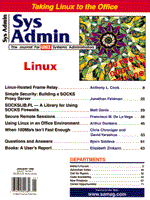
Editor's ForumFor many people, PC UNIX is synonymous with Linux, the traditional theme of our January issue. Linux has gained significant popularity over the last several years and is starting to make inroads within corporate environments. While most corporate executives are still nervous about having freeware on the corporate LAN, the combination of commercial support and availability for multiple chip architectures has provided sufficient comfort for administrators to use Linux for various applications. Web servers, firewalls, and other network-related uses appear to be the most popular. Notwithstanding the near-meteoric rise in popularity of Linux, we should remember that Linux is a relative newcomer to the field. Other inexpensive versions of UNIX for Intel-based platforms, such as FreeBSD, continue to be developed and form the basis for various commercial products. On the overtly commercial side, SCO, a longtime vendor of commercial UNIX for PCs, continues to support both SCO OpenServer and new developments for UnixWare. Although SCO OpenServer will likely be merged into UnixWare at some point, many small companies still rely on OpenServer to run their businesses. That customer base will force SCO to continue to support OpenServer for several years. SCO has been quite clear, however, that UnixWare is the preferred enterprise-level OS in their product line, and has been industrious in garnering support from most major vendors of Intel-based servers. SCO is not the sole player in that field, however. Sun Microsystems recently renewed its focus on the PC UNIX market, making a push with version 2.6 of its Solaris x86 OS and causing one major server vendor to jump from the SCO UnixWare camp. While Solaris x86 has a distinct advantage in the ease of porting applications between Solaris x86 and SPARC Solaris environments, the jury is still out on whether Sun will maintain sufficient emphasis on the x86 side to make a dent in SCO's market share. Of greatest interest to system administrators is the fact that both SCO and Sun continue to augment their PC UNIX offerings with elements that ease the enterprise-level integration of UNIX systems and PC platforms running Microsoft Windows. The delay of robust multi-user features in Windows NT will likely add nourishment for both the SCO and Sun versions of PC UNIX. Some would argue, in fact, that multi-user features must be designed into the core of an operating system, as with all versions of PC UNIX, not added as an afterthought as Microsoft appears to be doing with the future release of Windows NT 5.x. Additionally, reported upcoming changes in the pricing of server versions of Windows NT have all but eliminated the price advantage Microsoft previously held. Although the market ultimately will decide the success of each of these operating systems, the market is more complex than some people think. The market consists of more than just Fortune 1000 companies. Small businesses, and sophisticated individual home users also contribute a significant share. Small businesses were early adopters of PC UNIX for various economic and logistical reasons, including the need for business-specific vertical applications. Vertical applications are still the realm of VARs and system integrators. Those organizations, in turn, need platforms and operating systems that allow them to make a reasonable profit, so they can continue to support their software customers. Commodity server hardware and fat-client PCs do not fit well with their business model, nor that of many of their clients. All of this suggests to me that PC UNIX will be around for quite a while. If so, your confidence in implementing PC UNIX-based solutions within your organization should also be bolstered.
Sincerely yours, |